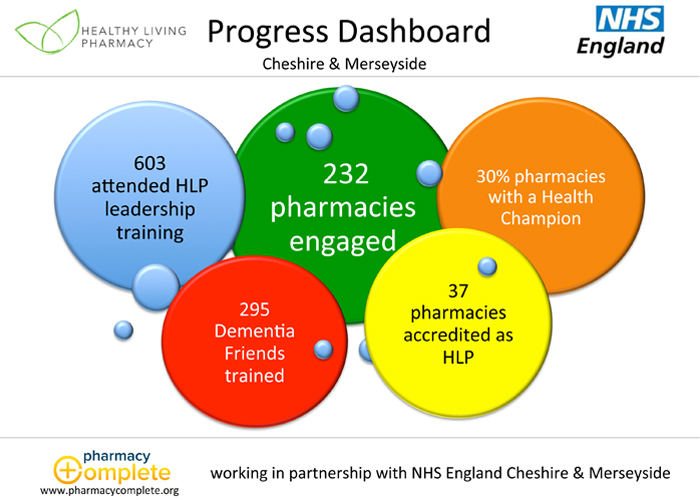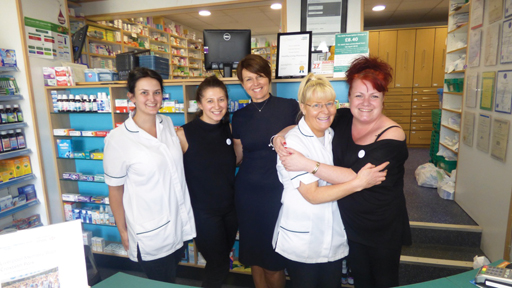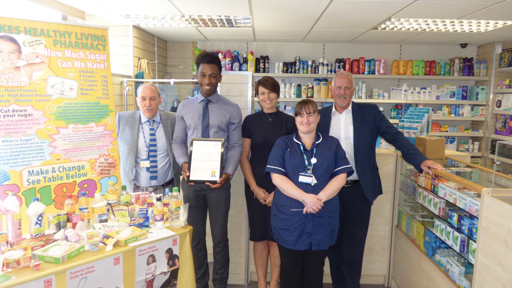Latest

Cheshire & Merseyside get behind HLPs
In Latest
Discover the latest pharmacy news with daily updates and information to keep you in the know.Bookmark
Record learning outcomes
Over 230 pharmacies in Cheshire and Merseyside are in the process of becoming healthy living pharmacies as Public Health England revises the quality criteria to enable a profession-led HLP self-assessment process.

Public Health England (PHE) has launched a revised set of quality criteria that will form part of a profession-led self-assessment process for pharm-acies wishing to become a healthy living pharmacy (level 1).
The quality criteria have evolved over time with some areas defining their own requirements, leading to slightly different HLP ‘standards’ across the country. This was a potential issue for a nationally recognised award, so the decision was made to update the criteria to reflect a changing NHS, changes in contractual specifications and GPhC standards.
Now any community pharmacy in England has the opportunity to become a HLP provided it meets the requirements set out in the quality criteria and complies with the self-assessment declaration process. It also means that there will be a nationally consistent entry for the HLP concept which, in due course, will mean that members of the public and others will know what to expect from a pharmacy showing the HLP logo. The logo may be rebranded as part of the update.
Cheshire and Merseyside
Recognising the benefits of the HLP programme, NHS England Cheshire and Merseyside is providing extensive support to all contractors who have expressed an interest in becoming a HLP.
The vision for Cheshire and Merseyside is ambitious – to enable 200 of the 607 contractors to become HLPs, or be well on their journey, within a 12-month period. Development support was planned to be delivered in two cohorts – 100 pharmacies starting in January 2016 (phase 1), with 100 more starting in July (phase 2). The aspiration is to have every pharmacy in Cheshire and Merseyside achieve HLP level 1 status.
Such a level of engagement and pace of delivery has not been achieved elsewhere and is being undertaken at a time of great uncertainty with the proposed funding cuts.
Monitoring progress
As with any plan, it is vital to monitor progress so that any variation from expectation can be understood and acted upon. Monthly dashboard reports are provided to NHS England, providing information on:
• The number of pharmacists who have expressed an interest in HLP
• The number of people who have attended a leadership event
• What percentage of pharmacies have started the HLP journey (defined as having booked on or attended an event)
• The percentage of pharmacies with a qualified health champion
• The number of pharmacies that have fulfilled all criteria to be a HLP.
The data is provided as a total for the area, by LPC and for each local authority, which allows LPCs to engage with their contractors and informs local commissioners of how the pharmacies in their area
are progressing. Reports are also provided to the larger multiples who have engaged in the programme.
UPDATE: There is now a total of 50 accredited HLPs in Cheshire and Merseyside.
Programme launch
The programme was launched in January 2016 with two commissioner and two contractor engagement events where the vision was shared, and individuals participated in implementation planning.
The numbers attending the events were outstanding, proving there is real appetite for the HLP programme, not only from the pharmacy teams but also from the commissioners across CCGs and local authorities, who value the importance of having a quality standard associated with HLPs.
In several areas of the country commissioners now view pharmacies with the HLP quality mark as the preferred providers of health and wellbeing services.
A launch prospectus was sent to every contactor, together with an expression of interest (EOI) form. An initial 100 EOIs were expected but this was far exceeded when 296 contractors (49 per cent of the total contractor base) said they wanted to be involved.

At the time of expressing an interest, 93 per cent of the respondents were delivering MURs, 68 per cent delivering flu vaccinations (2015/16 season) and 65 per cent accredited to deliver a commissioned emergency hormonal contra-ception service. This high level of demand led to phases 1 and 2 being merged with a view to completing all training for this cohort by the end of last month.
Developing and motivating teams
Fundamental to the success of HLP has been the change management that takes a pharmacy from a predominantly reactive supply model to one where proactive health promotion and delivery of services is an integral part of day-to-day activity.
Recognising the importance of engaging the whole team and developing HLP leaders to enable the change that is required, NHS England Cheshire and Merseyside made a significant investment to enable 600 individuals to attend HLP leadership training – a one-day event which challenges HLP leaders to think about:
• The context in which they operate
• Challenges facing pharmacy
• How they can motivate and engage their teams to be high performing.
A programme of 25 events ran from March 2016 to the end of September, exceeding the target of 600 delegates attending.
Funding from NHS England enabled one HLP leader to attend with up to two members of his/her team as prospective health champions, allowing them to have a shared experience and develop together their own plan for HLP.

There are some common areas of learning followed by specific sessions where the leaders spend time considering how to engage and motivate their teams, while the pros-pective health champions develop skills to turn their local knowledge into action.
Health champions are critical to the HLP concept. The title is given to those who have undertaken and passed the Royal Society for Public Health’s (RSPH) Level 2 Award in Health Improvement.
Recognising the importance of responding to an individual’s preferred learning style and what might work best for a pharmacy contactor, NHS England commissioned three providers of the RSPH qualification so that e-learning, distance-learning with support and face-to-face options were available. Individuals could choose whether to learn ‘under their own steam’ and in their own time, or attend a day event where the assessment was part of the training.
To date, around a third of pharmacies have a qualified health champion with many more in the process of attaining the qualification.
Keeping the momentum going
Sustained change requires ongoing communication and engagement to keep everyone involved and motivated. Contractors have received a number of emails including information targeted specifically to where they are on their HLP journey, links to a Facebook page for health champions and a newsletter.
Local commissioners have also been kept up to date, with the HLP steering group playing a key role in promoting the role of HLP and community pharmacy as a provider of health and wellbeing solutions for local populations.
Self-declaration process
When PHE announced its intention for a profession-led self-declaration of compliance to HLP level 1, Cheshire and Merseyside established an interim process for those pharmacies that had expressed an interest. An essential principle of this self-declaration process is that a pharmacist signs the declaration as a registered healthcare professional, but a proportionate (and simple) quality assurance process needs to underpin this declaration to assure commissioners and others that everyone is meeting the requirements set out in the quality criteria.
To make this whole process simple and less onerous for the contractor, as much information as possible is held on the HLP database.
Once a contractor sends in a self-declaration form, the information is checked against the database and some sample pharmacies are contacted as part of a quality assurance process. Quality assurance nationally is currently being supported and considered by the RSPH, appointed by Public Health England.
Once a self-declaration has been verified, the pharmacy is recognised in Cheshire and Merseyside as a healthy living pharmacy and is sent a HLP award pack, which includes a HLP congratulatory letter, HLP certificate, badges for all the team, balloons and a door logo sticker.
What about HLP in light of the recent Government moves on funding?
The recent Government announcements on funding reforms have created a real challenge for owners of community pharmacies (writes Michael Holden). Namely, whether to reduce investment in their people and premises to mirror reduced revenue, or to invest appropriately to develop new funding streams and to differentiate themselves in difficult and competitive times.
The proposed Quality Payment scheme has the potential to deliver up to £6,400 of funding that would otherwise be lost. Some 20 per cent of this (around £1,280 a year) comes from becoming a level 1 healthy living pharmacy (HLP).
This recognition of HLP as a quality mark in the contract is to be welcomed. There are many benefits in doing so that go beyond that payment, e.g. team role satisfaction and productivity, improved customer experience and loyalty, community engagement, sales and service development.
Assuming the gateway criteria are met, those who take action now to become a HLP before 1 April 2017 will have the opportunity to claim that payment immediately.
Next steps
Further funding to support 120 more pharmacies to develop as HLPs has been secured by NHS England, bringing the total funding to more than £300,000. Engagement of this second wave of pharmacies will begin in 2017 following the conversion of as many of the phase 1 intake as possible.
Learning acquired during the first wave will be incorporated to further streamline the development options for health champions.
In addition, further support including one-to-one coaching, will be provided to pharmacies on their HLP journey to ensure those who have made the initial commitment to the concept will complete their journey and fully convert to HLP level 1 via the self-declaration process.
Materials to enable health champions to make the most of their acquired knowledge will be made available and a full campaign programme will be in place for 2017, supported by NHS England. Health priorities that have been agreed include antimicrobial resistance, smoking, bowel cancer, alcohol, winter health and blood pressure.
Enabling each community pharmacy to look at their business, team capabilities and local population needs will be critical to their future sustainability. Healthy living pharmacies are a key enabler of this.
Article contributed by Deborah Evans and Michael Holden of the consultancy Pharmacy Complete, which has been project managing and delivering the HLP programme in Cheshire and Merseyside and is a provider of HLP leadership, knowledge in action and Dementia Friends training, and is also a RSPH-accredited centre to provide the health champion qualification. Both Deborah and Michael have been involved in developing, implementing and leading the HLP concept since its beginnings in Portsmouth in 2009.
CAPTION FOR THE PICTURES: Deborah Evans (centre) from Pharmacy Complete with staff at Drakes Pharmacy (left) and Orrell Park Pharmacy in Liverpool, among the first to be HLP-accredited in Cheshire and Merseyside
